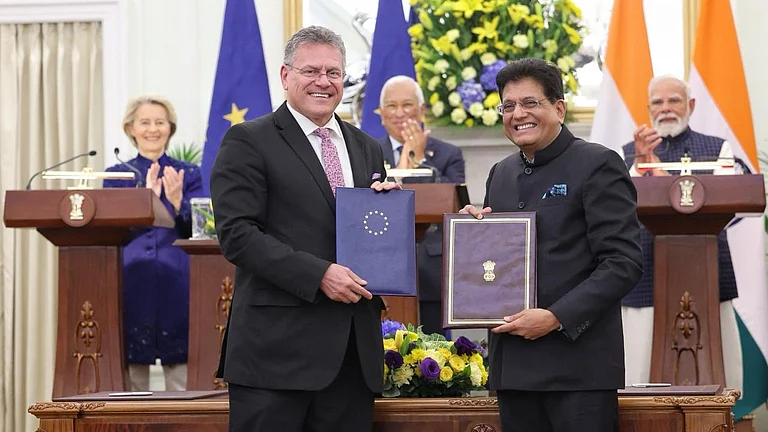India and United Kingdom signed a free trade agreement (FTA) on Thursday in the presence of Prime Minister Narendra Modi and UK PM Keir Starmer.
Aiming to enhance bilateral trade to $120 billion by 2030, the trade deal is expected to double the current trade volume between the two countries. Additionally, the deal provides near-complete tariff elimination for Indian exporters, unlocking significant opportunities across various sectors.
India’s principal advantage under this agreement will be in duty-free access for its labour-intensive sectors, processed food items and other high-tariff product segments where India holds a strong competitive edge.
In addition to the presence of the two Prime Ministers, the event also witnessed Commerce and Industry Minister Piyush Goyal and British counterpart Jonathan Reynolds signing the document.
So, what does India gain from this historic deal. Here’s a detailed look at it:
What will be India’s Major Benefits?
In a massive win for the agriculture sector, farmers will get preferential access to the UK’s $37.5 billion agri market. India will also protect its sensitive sectors like dairy, vegetables, apples, cooking oils, oats, etc. Apart from that, traditional farming knowledge will also receive patent protection.
In addition to that, the $5.4 bn UK market for marine products will now open for Indian exports as the UK’s import duty on marine products will now fall to zero from up to 20% currently.
That apart, around 75,000 Indian workers will benefit from the Double Contribution Convention (DCC). This will essentially exempt Indian workers and their employers from social security contributions in the UK for up to three years, significantly improving take-home pay and reducing costs for Indian companies. Additionally, professionals will also get better mobility access to the UK by getting simplified access for contractual service providers, business visitors as well as independent professionals.
Up to 1,800 Indian chefs, yoga instructors and classical musicians can move temporarily to the UK to provide their services.
Immediate Gains for Labour-Intensive Sectors
India’s MSME ecosystem encompasses a number of labour-intensive sectors. These sectors, which employ millions, will now receive zero-duty access to the UK market under the trade agreement. The sectors include Textiles and Clothing, Leather and Footwear, Gems & Jewellery, Furniture, and Sports Goods and Processed Food.
The Textiles and Clothing sector was previously subject to duties of up to 12%. Now, this has been completely liberalised for Indian exports to the UK. The elimination of tariffs enhances India’s competitiveness against countries such as Bangladesh and Vietnam and boosts large-scale exports of value-added garments.
Earlier, products from the Leather and Footwear sector were levied a duty of 16%. These have now been brought down to zero, marking a significant win for exporters, especially from states like Uttar Pradesh and Tamil Nadu.
Apart from that, goods from the Gems, Jewellery, Furniture and Sports sectors were subjected to duties of up to 4%. Now, these sectors will benefit from full duty elimination. This will significantly boost exports of handcrafted, artisanal, and design-intensive products.
The Processed Food sector also stands poised to gain significantly. Products that earlier faced duties as high as 70%, will now enjoy zero duty on 99.7% of tariff lines.
Additional Gains
Apart from the benefits for the labour intensive sectors, India has also secured enhanced market access in sectors where it already holds strong export potential but earlier had to face moderate tariff barriers.
For the marine and animal products sector, tariffs of up to 20% have now been reduced to zero. Thereby, exporters of seafood, dairy and meat products can now benefit significantly.
Further, in the sector of vegetable oils and plant-based products that earlier faced duties of up to 20%, tariff elimination due to the FTA will benefit exporters of edible oils, oilseed derivatives, and other plant-based commodities. This development will also support exports of packaged foods, tea, coffee and spices which are vital to India’s agri-processing sector and rural economy.
Additionally, duties have been eliminated from the chemicals, electrical machinery, mechanical machinery as well as plastics or rubber sector.
How the Deal Aligns with India’s Development Agenda
With these gains, India’s broader industrial strategy under initiatives such as ‘Make in India’ and the Production Linked Incentive (PLI) Scheme is also expected to get a boost. The India–UK FTA has been strategically crafted to deliver immediate and meaningful benefits to sectors with high employment intensity, especially textiles, leather, plastics, artisanal products and processed food segment.
Commenting on this latest development, Manoj Mishra, Partner and Tax Controversy Management Leader at Grant Thornton Bharat said, "The signing of India–UK FTA today is a breakthrough in India’s trade diplomacy, delivering near-total tariff elimination and zero-duty access for 99% of Indian exports. This opens up substantial market gains for labour-intensive sectors like textiles, leather, and marine products, as well as high-value exports such as gems, auto components, and chemicals. India has also secured strong commitments in IT, financial, and professional services deepening services trade."
"The exemption from UK social security contributions for Indian workers on temporary assignment offers direct tax relief, lowering costs and improving competitiveness. This deal sets a new standard for India’s trade agreements with developed economies," he added.


































